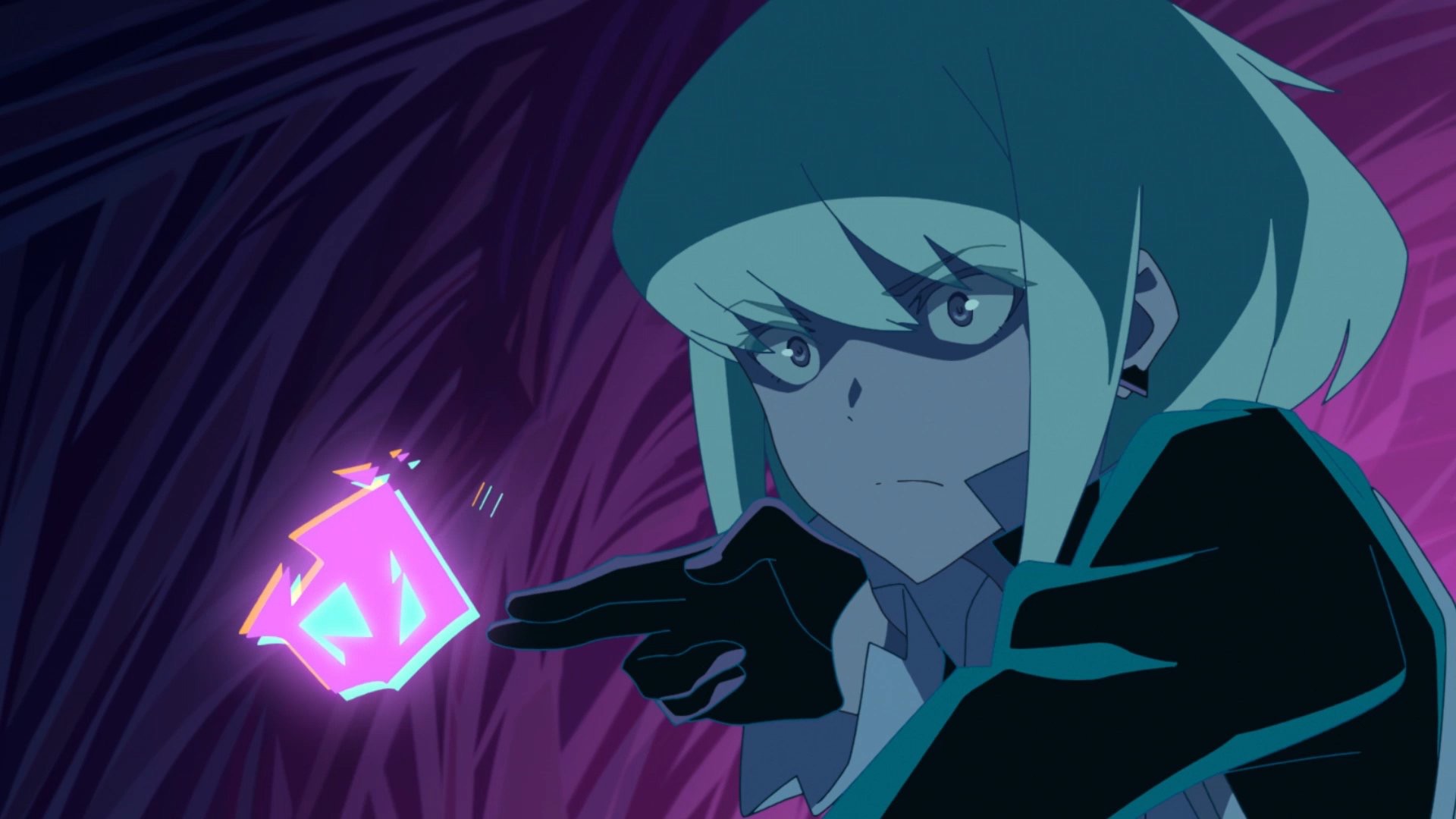Promare: The Colorful Queer Dystopian Action Drama We Needed
Promare is the new action drama anime film from Studio Trigger. The film is delightfully colorful and surprisingly queer.
Words can’t express just how visually stunning Promare is. That in and of itself is enough reason to trek out to a theater during its limited run to see it on the big screen. If you decide to do just that, you should get to it because it won’t be in theaters long. Check out Fathom Events’ page for details on when and where it’s showing, and get to it ASAP, otherwise you’ll have to wait until at least February when the Japanese DVD/Blu-ray comes out, and possibly much later for the English version. So get going now because there’s going to be a huge gap in availability for this. UPDATE: You can now buy Promare on DVD/Blu-Ray and Digital Download!
Beyond the beautiful visuals, Promare offers many more enticing reasons to see it. The main themes touching on disenfranchisement and discrimination cut deep and provide a lot of space for discussion. Additionally, the characters are well built and relatable, meaning those of us with fannish tendencies have a lot to cling on to after leaving the theater. Fanfic, fan art, and meta will keep us entertained for many months to come. And, hell, it’s just a little bit queer too. That’s an undeniable aspect of it that’s well worth the cost of admission and a draw in and of itself for many.
But before I can dive into any of the other amazing qualities of Promare, I need to throw up a spoiler warning. The rest of this review will not be spoiler free, so you should go grab your tickets now, watch it, and then come back to join the conversation. And trust me, there’s a lot to discuss.
PROMARE SPOILERS BELOW
The biggest theme in Promare is the disenfranchisement and discrimination of our fellow humans. The Burnish are blatantly analogous to other marginalized groups in today’s society and it’s not hard to draw direct parallels throughout the film. They are treated as sub-human, something to be feared, and they are arrested and abused just for being who they are.
Those that remain free gather in makeshift refugee camps in an attempt to just live their lives as peacefully as possible, separate from society at large. Those that manage to “pass” as non-Burnish in society have to repress a vital part of themselves in order to survive. Once found out, they and their allies are dragged away and tortured. It’s all rather horrific.
It’s not hard to see the message here. The message is, in a way, timeless, as humanity has a habit of doing this to marginalized groups over and over again throughout history. The fact that we’d do this in the future to our fellow man doesn’t seem at all far fetched. It’s rather depressing just how not surprising this is. Of course we’d do this to our fellow man. Of course. We always do.
Despite this, the vibe of the film isn’t entirely pessimistic. Lio Fiota takes on the role of a freedom fighter in this analogous narrative. He’s dubbed a ‘terrorist’ by society because of his violent ways, but hailed as a hero among his people. This, too, feels startlingly familiar. In this particular case, Lio is an even more sympathetic freedom fighter as his ethics prevent him from killing people without just cause. Instead, he chooses to focus on the destruction of property as he fights to free and protect his fellow Burnish. It’d be more difficult to sympathize with him without that particular ethical clause, of course, but still not entirely outside the realm of possibilities. Society is messy and nothing is black and white. Even if he didn’t have this strict moral code, he would still be somewhat morally gray instead of strictly an antagonist.
 While Lio represents the freedom fighter aspect in this allegorical film, Galo Thymos represents the sympathetic ally to the downtrodden. When we first meet him, he and Lio are at odds due to the very nature of their respective jobs. Lio is a Mad Burnish terrorist lighting fires around Promepolis and Galo is part of the Burning Rescue team. One lights fires; one saves people from them. It’s an obvious conflict right off the bat, but that antagonism doesn’t last long. Conflict soon gives way to understanding and a partnership that left me shook. But I am getting slightly ahead of myself on that front, so stick with me for a minute here.
While Lio represents the freedom fighter aspect in this allegorical film, Galo Thymos represents the sympathetic ally to the downtrodden. When we first meet him, he and Lio are at odds due to the very nature of their respective jobs. Lio is a Mad Burnish terrorist lighting fires around Promepolis and Galo is part of the Burning Rescue team. One lights fires; one saves people from them. It’s an obvious conflict right off the bat, but that antagonism doesn’t last long. Conflict soon gives way to understanding and a partnership that left me shook. But I am getting slightly ahead of myself on that front, so stick with me for a minute here.
This ability for empathy towards others is something that’s a vital part of Galo’s characterization. We see that Galo is sympathetic towards the Burnish early on when the pizza maker is revealed to be passing as non-Burnish. When most of the pizza shop patrons act disgusted that they were served food made by a Burnish, he shows no such disgust and actually sides with the pizza maker.
The desire to save others is Galo’s driving force and these sorts of differences aren’t a priority to him. It doesn’t matter if those others are Burnish or non-Burnish. If people need help, he’s there to provide it.
This makes his slide towards becoming Lio’s eventual partner easier, but his journey is still powerful to watch. Learning that the society you were raised in and benefited from has been actively harming other human beings for their differences isn’t an easy thing to accept. But Galo listens to Lio and comes to terms with the lies he’d been told, eventually fighting alongside him as they save both Burnish and non-Burnish alike.
And here comes the queer aspect of the film, which was far more pronounced than I expected. Based on my Twitter feed prior to going to see the film, I assumed these two characters were highly shippable. It’s a perfect enemies-to-lovers trope, and I’m a sucker for that type of stuff in general, but I expected this to remain largely subtextual.
What I did not expect was for Galo to save Lio with a kiss of life or for that kiss of life moment to linger for so damn long. This went far beyond my expectations and I couldn’t be happier. I’m not ashamed to admit I gasped out loud when it happened.
 It’s important to note that Promare has all the hallmarks of a film ‘aimed towards boys.’ I absolutely hate to gender things like this – especially genres as a whole as I feel anyone can watch anything – but it’s a sad fact of media that certain genres are ‘aimed’ at certain demographics. In this case, mecha and action style anime tends to be thought of as a straight-dude thing. Having the two male leads lip lock in a film aimed towards a straight male demographic at most dramatic part of the story is mind blowing and unexpected.
It’s important to note that Promare has all the hallmarks of a film ‘aimed towards boys.’ I absolutely hate to gender things like this – especially genres as a whole as I feel anyone can watch anything – but it’s a sad fact of media that certain genres are ‘aimed’ at certain demographics. In this case, mecha and action style anime tends to be thought of as a straight-dude thing. Having the two male leads lip lock in a film aimed towards a straight male demographic at most dramatic part of the story is mind blowing and unexpected.
I hate gendering genres like this in general. I’m a queer woman and I went and saw this film, and I’ve seen a lot of other mech and action flicks, too. So, while I detest this sort of delineation for genres, it’s a sad reality of the industry right now and it’s worth acknowledging the significance of the kiss in this context. So yes, I hate it, but it’s a thing and we should at least acknowledge the context here.
It may be easy to write off the kiss as “CPR” or a magical kiss of life. Absolutely, this can be used as an out for the queerness that becomes so blatant at that moment. But the writers could have chosen to have Galo save Lio in any other way. They could have chosen to have the chest compression save him, or they could have chosen for Galo to give Lio the flame in some other way that didn’t require them to kiss. But they didn’t. They chose to let this moment hang there on the screen in all its beautiful queerness.
Beyond the kiss, we have a lot of material to work with when it comes to viewing Promare through a queer lens. This is the type of stuff that is usually confined to subtext, leading to those of us who pick up on these things being accused of “reading too far into it.” And sure, sometimes that could be the case. Queering texts is something we do sometimes just for fun, but sometimes as part of a deeper analysis. It’s just a thing. But now that we have a canon kiss, it makes these observations hard to deny and lends some validity to this type of reading.
 The climax of the film involves Lio and Galo co-piloting a mech together as they save the world from the burn out of the Promare. This in and of itself is an intimate act and requires the pilots to be deeply in tune with one another. One of the most prominent examples of this in the mech genre is Pacific Rim, where Mako and Raleigh ended up being an incredible shippable pairing in fanon despite their romance not actually blossoming blatantly on screen. The subtext of being ‘drift compatible’ was enough to get the point across.
The climax of the film involves Lio and Galo co-piloting a mech together as they save the world from the burn out of the Promare. This in and of itself is an intimate act and requires the pilots to be deeply in tune with one another. One of the most prominent examples of this in the mech genre is Pacific Rim, where Mako and Raleigh ended up being an incredible shippable pairing in fanon despite their romance not actually blossoming blatantly on screen. The subtext of being ‘drift compatible’ was enough to get the point across.
The queerness in the text is also a lot more subtle, and perhaps somewhat accidental. The Burnish are represented by triangles throughout the film, and each Burnish’s flames take on a specific highlight color. Lio’s colors are pink and turquoise, which means he’s consistently surrounded by a pink triangle motif at numerous points in the film. Pink triangles have been a symbol for queer people for a long time, dating all the way back to Nazi Germany when it was used in concentration camps. It has since been re-appropriated and the symbolism has continued to be used by the queer community even today.
Were the pink triangles intentional? I don’t know. Is it me queering the text and watching media with queer goggles strapped to my face? Maybe. But again, they kissed, so queering the text doesn’t seem to be so out of left field with this one.
The color in Promare is another surprising aspect of the film that goes against the grain for the genre. It’s a strange neon pastel explosion of color that’s so unlike any other film I’ve ever experienced in any genre. Once again, I hate to gender these things, but when pink is a primary color motif in a mech genre film, it’s notable. Especially when the color is representative of one of the badass protagonists who uses his extremely powerful pink flames to cause massive amounts of destruction.
Promare doesn’t care about pink being a gendered color. It doesn’t care about fitting into a box and trying to appeal to the demographic its expected to appeal to. It explores the universe it created boldly and shatters the confines of its genre. It’s incredibly delightful.
It’s hard to find anything negative about Promare, so this review may feel a bit slanted towards the positive while I do often try to be more balanced with my critique. Perhaps my only criticism is that it’s difficult for a lot of people to go see it right now. It’s earned more than $8 million USD worldwide at this point, which is no small sum of cash, but it’s still only in select theaters for an extremely short period of time. Several of my friends have driven hours to get to a theater to see it. (Again, UPDATE: You can buy it now!)
But I understand why it’s limited, even if it’s frustrating that half my friends can’t join in on the fun quite yet. It’s a testament to how appealing this film is that people are driving hours to see the film considering it’s not part of a larger franchise and doesn’t have a built in dedicated fanbase. Part of that may be the fact that it’s produced by Studio Trigger, which has an incredible reputation in the industry for producing high quality works, but I think a large part of it is also word of mouth. I didn’t go because of the studio that produced it. I went because of the chatter on Twitter. And the chatter is good.
If you have a chance, go see it now. And if you can’t, pre-order the DVD as soon as it becomes available (Update: Again, it is available now). We need more work like this out there in the universe and we can make that statement with our wallets. The better it does, the more content like it we’ll get. And this is definitely something I want to see more of in the future.
Author: Angel Wilson
Angel is the admin of The Geekiary and a geek culture commentator. They earned a BA in Film & Digital Media from UC Santa Cruz. They have contributed to various podcasts and webcasts including An Englishman in San Diego, Free to Be Radio, and Genre TV for All. They identify as queer.
Help support independent journalism. Subscribe to our Patreon.
Copyright © The Geekiary
Do not copy our content in whole to other websites. If you are reading this anywhere besides TheGeekiary.com, it has been stolen.Read our








All this and not a single mention about that heart shaped smoke/explosion? lol